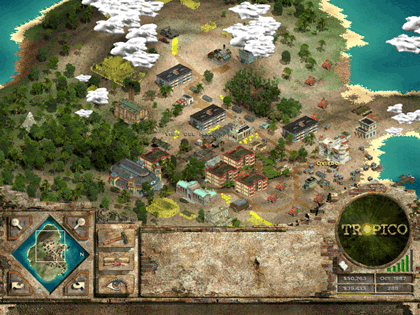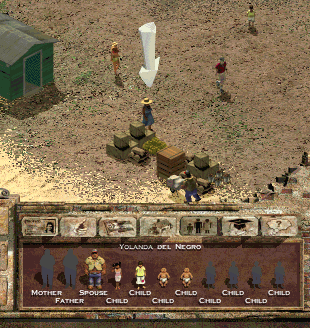Review: Tropico

Developer: MacSoft (product page)
Price: $39.99
Requirements: G3 Processor, Mac OS 8.6 or Mac OS X 10.0.2, 850 MB disk space.
Trial: None
I’m sure that just about everybody out there has sat down and played some sort of simulation game. The granddaddy of this genre would have to be SimCity. I was introduced to this game on a black and white IBM with an 8086 processor (for those lucky enough never to have used a DOS-based computer, that’s an old computer). Now, I’m playing MacSoft’s Tropico on my Power Mac. Things have certainly come a long way since my days a grayscale city building.
Installation
Tropico installs the same way as just about any other Mac application, with one exception—the installer can run under both the Classic Mac OS and under OS X. This is because Tropico is Carbonized for use in either environment. The only caveat is that running the installer under OS X is extremely slow. At first, I thought the application had crashed. Turns out it was launching very slowly.
When the installation is done, you end up with roughly 830 MB of stuff. This includes two copies of the application—one for OS X and one for OS 8 and 9—as well as movies, maps, voices, scenarios, and other graphics. .
Game Play
Tropico’s roots lie in the city building simulation domain. However, it builds on this base to become something different than the norm.

First off, instead of designing some generic city in the middle of nowhere, you’re ruling a Caribbean island. You take power in 1950, in the midst of the Cold War. Barring rebellion, coup d’état, or losing an election, you will rule until 2000 and beyond. Considering the period, your decisions will be monitored by both the USA and the Soviet Union.
Furthermore, your dictator’s personality influences the path of the game. You start off by basing your personality on one of 19 real-life dictators like Mussolini, Evita, Castro, and Papa Doc. Then you choose how you initially take power (election, revolution, installed by KGB), your strengths (charismatic, financial wizard), and your weaknesses (womanizing, flatulent). All of these factors influence how you are viewed by the various factions on your island and by the two world superpowers.
Your island is not even isolated from the rest of the world. Along with trying to please the USA and/or the Soviet Union, you need to worry about things such as tourism, trade, immigration, and emigration. These all contribute to the financial well-being of both your island and yourself.
Unlike most simulation games, just because you created your island out of thin air doesn’t mean you get to rule forever. By design, you have 50 years to accomplish whatever goals you selected at the start of the game. You can choose to play beyond this time, but anything that happens thereafter won’t affect your final score. Of course, there’s always the possibility that you might not make it the full 50 years. Your citizens could remove you through an election (assuming you choose not to “correct” a few ballots). They could also drive you out through open rebellion. Similarly, the military could turn against you. Also, there’s nothing stopping the USA or the Soviet Union from stepping in and taking control if they don’t like the way you’re running things. In short, it’s very much like running a real banana republic.
Since you don’t really have lots of job security, you also need to put a little something away in case things turn bad. Fortunately, you have a Swiss bank account into which you can siphon funds. If you start skimming too much, though, people might realize that something is amiss and hold you accountable.
As dictator, you get to decide almost everything about your island. For instance, you get to pick almost every building that appears on your island (people will build shacks on their own if there’s insufficient housing). These building don’t just appear, though. They take time and manpower to build. If you decide that your island needs five farms, two hotels, and a power plant, you will probably be waiting several years to see all these completed.
Your work is not done once the buildings are complete. For farms, you need to decide what they’re producing. Different crops grow better on different parts of the island. Furthermore, some crops are better suited for feeding your people while other are better for exporting to the rest of the world. For housing, you need to decide how well you want to maintain the buildings and what you want to charge for rent. For places of work, you need to set wages. Of the Sim games that I’ve played, SimTower comes closest to matching Tropico’s level of control. That said, the Tropico system is far more complex than SimTower.
Along with creating your own island and setting your own victory goals, Tropico comes with several scenarios, some with very specific goals, for you to play—things like “sell lots of Tropican cigars” and “prove to cousin Fidel that you can run your own island”. PopTop Software has already released two new scenarios (they can be decompressed with StuffIt Expander and the first version of Tropico for the Mac incorporated all of the 1.0.3 changes, so you’re all set for running the scenarios).
The Tropicans
Another area where Tropico excels is the way it handles people. I would say that this aspect of the game falls somewhere between SimTower (where you could name people and see their happiness with your building) and The Sims (where you can control almost everything). Although you can’t manipulate your people by telling them exactly what to do, you can find out all sorts of information about them—you can view their needs, their thoughts, their political leaning, and their families.
People in Tropico live full lives. While they do change over the course of their lives, their actions make sense based on their beliefs. An ardent supporter won’t suddenly start to hate you unless you do something to prompt his reaction. For instance, in one of my games, there was one particular citizen who ran against me in three straight elections until the time he died from cancer. I was never able to fulfill his wishes while running the island, so he was always determined to defeat me.
Although you can’t tell individual citizens what to do with their lives, there are other ways to manipulate them. If there’s a particularly annoying citizen you want to discredit, you can have that person declared a heretic. If that doesn’t work, throw them in jail. These actions have side effects—your target and his or her family won’t be particularly fond of you, for instance. If these methods aren’t strong enough, you can have the citizen assassinated. At this point, his or her opinion of you really doesn’t matter. The victim’s family will not like you, though, and any witnesses to the murder will think less of you.

Yolanda Del Negro and her family.
Of course, punishment’s not your only option. If you’re feeling benevolent, you can simply bribe this person. The benefactor and his or her family will respect you more.
Graphics and Sound
I’m between video cards right now, so I played Tropico in software rendering mode. Nevertheless, the graphics were quite nice—I was even able to read the name of my hotel from its sign.

The 66 Hostel, a cheap hotel aimed at low-class tourists.
The individual characters were the only things that didn’t look great—when viewed at the closest setting, they were quite fuzzy. From some of the pictures I’ve seen on the Web, I have every reason to believe that the people, along with most everything else, would look much better if I were using OpenGL. For the record, Tropico does require a video card with 16 MB of video RAM to use OpenGL.
Along with the excellent graphics, Tropico sounds great. Most of the time, you’re treated to authentic Latin music, which sounds really good and adds to the enjoyment of the game.
Also, your advisor speaks with a Caribbean accent. He provides you with information about your people’s complaints and little comments about your reign.
Complaints
I only had one real problem with Tropico—I wasn’t able to get the OS X version of the game to run. I tried using the safe mode option, but this didn’t do any good. According to MacSoft’s technical support page for Tropcio, “It is recommended that you exit the game, reboot the computer into OS 9.1, and play the ‘OS 8 or 9’ version of the game.” I believe that’s called avoiding the issue. The Read Me says that you can run the OS 8 or 9 version of the game under Classic, which I did, but you are limited to software rendering if you choose this approach. According to some of what I’ve read about this game, some people have this problem and others do not.
Aside from this, I love everything about this game—well, aside from the fact that it cuts into the time when I’m supposed to be productive, that is.
The Bottom Line
Tropico is one of the most addictive games I’ve played in a long time. It takes the classic concept of the city building simulation and twists it into something new and original. If you’re looking for a game that is both enjoyable and challenging, look no further.
Reader Comments (2)
Electrification is more trouble than it's worth. Everything you need to do can be done without it. Take the basic things, food, housing, simple entertainment, wages, religion, etc., and provide them in abundance, and you will become very popular, indeed, my president!
Add A Comment